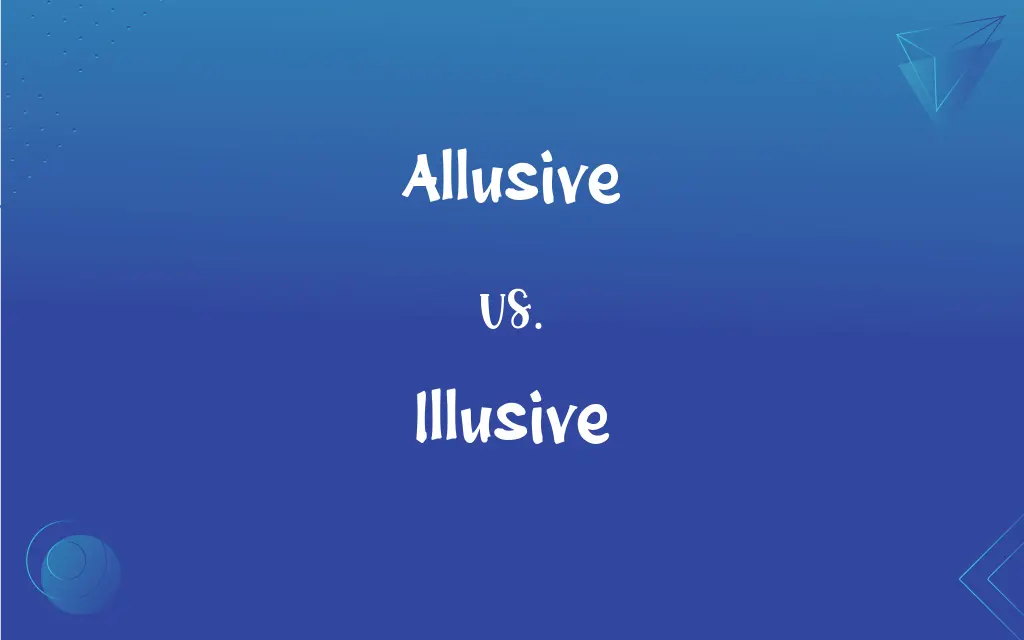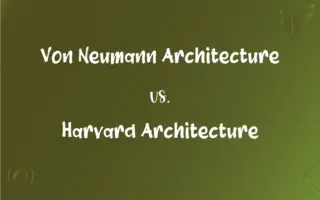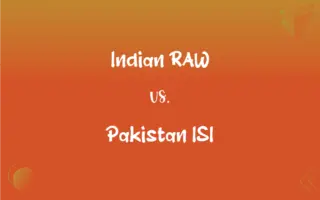Allusive vs. Illusive: What's the Difference?
Edited by Aimie Carlson || By Janet White || Published on July 27, 2024
Allusive refers to indirect or suggestive references, while illusive implies being deceptive or based on illusion.

Key Differences
Allusive language often hints at or suggests something without stating it directly, relying on the audience's knowledge or imagination. It's commonly found in literature, where references or implications enrich the text. In contrast, illusive language or experiences create a false perception of reality. They are often associated with things that are misleading or deceptive, challenging our understanding of what is real.
An allusive statement might refer to historical events, literary works, or cultural artifacts, expecting the listener or reader to make the connection. This indirectness can add layers of meaning to a conversation or text. On the other hand, something illusive is akin to a mirage, presenting an appearance that is not substantiated by reality. It's often used to describe phenomena or experiences that are elusive and hard to grasp.
Allusive content enriches language by drawing on shared knowledge and experiences. It thrives on the subtlety of understanding and interpretation, making it a favorite tool in poetry and prose. Illusive, however, pertains to something that tricks the senses or the mind, like an optical illusion or a deceptive idea, often leading to confusion or misunderstanding.
The effectiveness of allusive language lies in its ability to evoke deeper meanings and connections, enriching the reader's or listener's experience. Conversely, the nature of illusive elements is to bewilder or mislead, making something appear different from what it actually is, often leading to a sense of disillusionment once the truth is revealed.
Allusive speech or writing depends heavily on the receiver's ability to recognize and interpret the references, making it a sophisticated form of communication. Illusive, in contrast, plays on the fragility of perception, often used to describe situations, ideas, or objects that seem real but are not, highlighting the elusive nature of truth and reality.
ADVERTISEMENT
Comparison Chart
Definition
Suggestive or indirectly referring
Deceptive, based on illusion
Usage in Language
Adds depth and layers through references
Creates a false sense of reality
Common Contexts
Literature, speeches, cultural commentary
Optical illusions, deceptive practices
Impact on Audience
Requires interpretation and understanding
Often leads to confusion or realization
Purpose
To enrich content by indirect references
To depict something unreal or misleading
ADVERTISEMENT
Allusive and Illusive Definitions
Allusive
Indirect or symbolic.
The novel's allusive style left readers pondering its deeper meanings.
Illusive
Based on or producing illusion.
The magician's act was illusive, leaving the audience in awe.
Allusive
Using references or suggestions.
Her poetry is richly allusive, filled with nods to classical myths.
Illusive
Similar to a mirage.
In the desert, travelers often find water sources to be illusive.
Allusive
Hinting at something indirectly.
His speech was allusive, mentioning events from the 1960s without explicitly stating them.
Illusive
Deceptive or misleading.
The promise of quick riches turned out to be an illusive dream.
Allusive
Relying on the reader's or listener's ability to recognize allusions.
The allusive dialogue in the play requires knowledge of Shakespeare.
Illusive
Giving a false impression.
The shadows in the painting were illusive, creating a sense of depth.
Allusive
Containing or characterized by indirect references
An allusive speech.
Illusive
Elusive or hard to grasp.
The concept of infinity is often illusive to understand.
Allusive
That contains or makes use of allusions (indirect references or hints)
Illusive
Illusory.
Allusive
Figurative; symbolical.
Illusive
Subject to or pertaining to an illusion, often used in the sense of an unrealistic expectation or an unreachable goal or outcome.
Testing software completely is an illusive goal.
Allusive
Having reference to something not fully expressed; containing an allusion.
Illusive
Deceiving by false show; deceitful; deceptive; false; illusory; unreal.
Truth from illusive falsehood to command.
Allusive
Characterized by indirect references;
Allusive speech is characterized by allusions
Illusive
Based on or having the nature of an illusion;
Illusive hopes of of finding a better job
Secret activities offer presidents the alluring but often illusory promise that they can achieve foreign policy goals without the bothersome debate and open decision that are staples of democracy
Allusive
Employing a figurative or metaphorical use.
His allusive remarks about the garden were actually metaphors for life.
FAQs
What is the purpose of using allusive language?
Allusive language adds depth and layers to communication by referring to common knowledge or experiences.
Is allusive language always clear?
No, allusive language can be ambiguous, depending on the audience's knowledge and interpretation.
What does allusive mean?
Allusive refers to making indirect references or suggestions.
What does illusive mean?
Illusive refers to something that is deceptive, based on illusion, or not what it seems.
Is illusive the same as elusive?
No, illusive relates to deception or illusion, while elusive refers to something hard to catch or define.
How does illusive differ in its use from allusive?
Illusive pertains to deception or false appearances, whereas allusive relates to indirect references.
Is understanding allusive language important?
Yes, it enhances the appreciation and understanding of literature, speeches, and other forms of communication.
Can you give an example of allusive language?
A writer may make an allusive reference to a historical event, expecting the reader to understand the implication.
How do you identify something as allusive?
It's allusive if it hints at something without stating it directly, often requiring background knowledge.
Can illusive be used to describe a person?
Yes, if someone is not what they appear to be or is deceptive, they can be described as illusive.
Do all cultures use allusive language?
Yes, though the references and their interpretations can vary widely across cultures.
Are allusions always intentional?
Typically, yes. Allusions are usually a deliberate choice by the speaker or writer to convey a deeper meaning.
Is it easier to write allusively or illusively?
Writing allusively might be more challenging as it requires a depth of knowledge and subtlety.
Should writers avoid using illusive elements?
Not necessarily; when used effectively, they can add complexity and depth to a narrative.
Can an idea be illusive?
Yes, an idea can be illusive if it's based on false premises or is misleading.
Can allusive content be negative?
It can be, especially if it indirectly hints at something controversial or offensive.
Can illusive be a positive trait?
Rarely, as it typically implies deception or false appearance.
Is it possible for something to be both allusive and illusive?
Yes, a statement or idea can be both indirectly suggestive (allusive) and misleading or deceptive (illusive).
Are illusions always visual?
No, illusions can also be conceptual, misleading ideas or beliefs.
Can illusive elements enhance storytelling?
Yes, they can add intrigue or surprise by misleading the audience temporarily.
About Author
Written by
Janet WhiteJanet White has been an esteemed writer and blogger for Difference Wiki. Holding a Master's degree in Science and Medical Journalism from the prestigious Boston University, she has consistently demonstrated her expertise and passion for her field. When she's not immersed in her work, Janet relishes her time exercising, delving into a good book, and cherishing moments with friends and family.
Edited by
Aimie CarlsonAimie Carlson, holding a master's degree in English literature, is a fervent English language enthusiast. She lends her writing talents to Difference Wiki, a prominent website that specializes in comparisons, offering readers insightful analyses that both captivate and inform.






































































